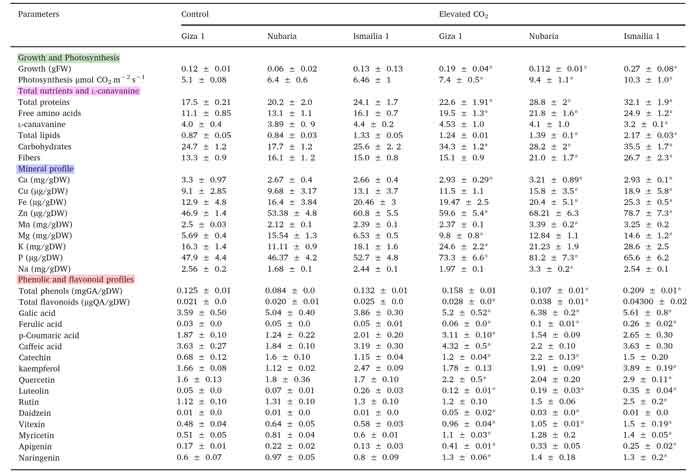| Tweet | Follow @co2science |
Paper Reviewed
Almuhayawi, M.S., Hassan, A.H.A., Al Jaouni, S.K., Alkhalifah, D.H.M., Hozzein, W.N., Selim, S., AbdElgawad, H. and Khamis, G. 2021. Influence of elevated CO2 on nutritive value and health-promoting prospective of three genotypes of Alfalfa sprouts (Medicago Sativa). Food Chemistry 340: 128147, doi.org/10.1016/j.foodchem.2020.128147.
Writing as background for their work, Almuhayawi et al. (2021) note that humans consume alfalfa (Medicago sativa) "as sprouts, dehydrated leaves or dietary supplements in the form of tablets or powder." Sprouts, in particular, are young seedlings and they are "valuable sources of protein, minerals, vitamins, glucosinolates and phenolic compounds." Consequently, sprouts are well-recognized as a healthy food.
Although many studies have examined the impacts of elevated CO2 on plant nutritive value, none so far have focused on alfalfa sprouts. Thus, Almuhayawi et al. set out to remedy this situation. Concentrating on three alfalfa cultivars (Giza 1, Nubaria and Ismailia 1), the team of eight Middle East scientists germinated seeds in environment-controlled growth cabinets under either ambient (400 ppm) or elevated (620 ppm) CO2. After ten days of growth the spouts were weighed and samples were taken for biochemical analysis.
And what did their work reveal?
It was little surprise that enriching the air with CO2 significantly increased the photosynthesis and growth (fresh weight) of all cultivars compared to ambient CO2 conditions. Specifically, as indicated by the data presented in Figure 1 elevated CO2 stimulated photosynthesis by 45%, 47% and 59% in Giza 1, Nubaria and Ismailia 1 cultivars, respectively, and it enhanced sprout biomass by 58% (Giza 1), 87% (Nubaria) and 108% (Ismailia 1). The CO2-induced enhancement of the photosynthetic process further aided in the accumulation of carbohydrates, proteins, fats and fibers, which parameters increased by respective three-cultivar averages of 46%, 35%, 57% and 41%. But the good news does not end here. Almuhayawi et al. further determined that elevated CO2 "boosted the levels of vitamins, phenolics, flavonoids and individual minerals and enhanced the antioxidant capacity of [the] alfalfa sprouts."
Commenting on their several findings the authors welcome and recommend elevated CO2 as "a simple and costless way with minimal challenges of application to improve the nutritive value, functionality and heal-promoting prospective of alfalfa sprouts to be a cheap but valuable source of bioactive compounds in the daily diet or used as a functional food additive to improve the nutritive value and health-promoting effects of food products."

Figure 1. Effect of elevated CO2 on the growth, photosynthesis, total nutrients (mg/gDW) and L-canavanine, mineral contents, and the phenolic and flavonoid profile (mg/gDW) of different alfalfa sprout cultivars. Values are represented by mean ± standard deviation of at least three independent replicates. Means marked by an asterisk (*) are significantly different than control at p < 0.05. Adapted from Table 1 and Table 2 of Almuhayawi et al. (2021).




